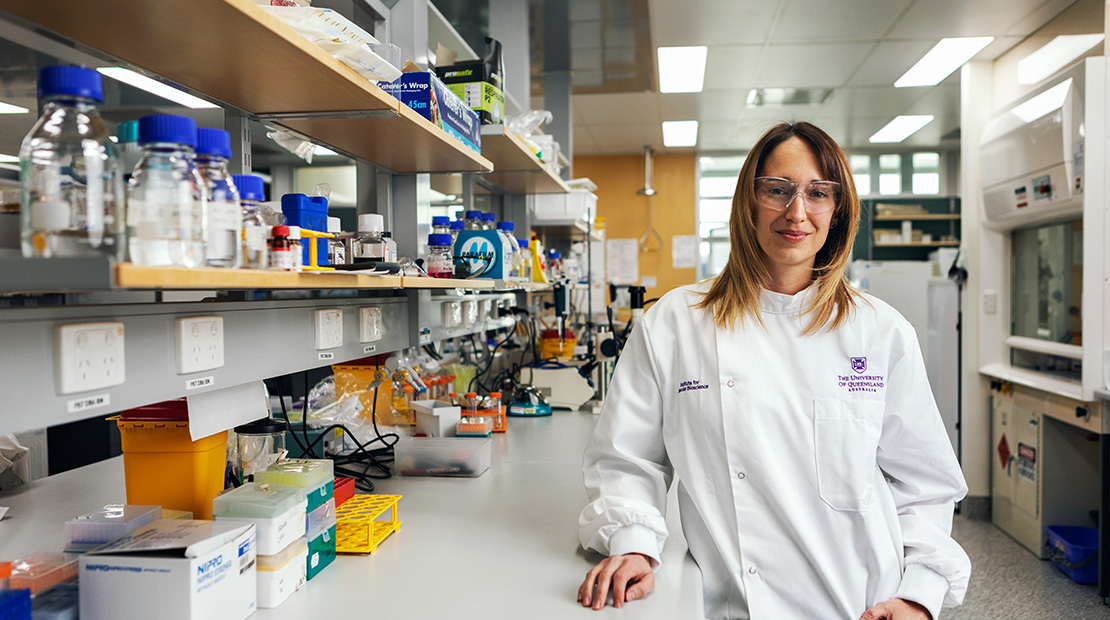Finding cures in the deadliest of venoms
Mention a venomous animal and you’re likely to think of it causing pain. But for researchers at UQ’s Institute for Molecular Bioscience, venomous animals and plants are proving an unlikely source of cures for pain – and other diseases such as heart attacks and stroke.
Professor Irina Vetter from IMB explains that venoms are such a promising source of treatments because of sensory neurons, nerves in our body that perceive the world outside our body.
“Sensory neurons transmit pain messages, and for a sting to be effective, it must be painful,” Professor Vetter said.
“So venomous animals and toxins have evolved to very specifically target sensory neurons.
"To treat pain, we also need to be able to target sensory neurons, so we’re examining the active components in venom and toxins to see if they can teach us how to do that.”
Chronic pain costs Australia $139 billion annually, ‘mostly through reduced quality of life and productivity losses’, according to a 2020 report from the Australian Institute of Health and Welfare.
“Pain causes enormous disruption to people's physical and mental wellbeing and their personal life,” Professor Vetter said.
"There is also a lot of stigma around pain because of the lack of understanding about its cause, and because you cannot see pain.
Current drugs either don't work or have terrible side effects, like addiction. But Professor Vetter and her team are studying venoms to find solutions.

The inherited condition causes intense burning pain in the hands and feet, which can only be relieved through medication and cooling.
Professor Vetter says a new treatment based on the spider molecule could minimise the need for opioids and has the added benefit of not being addictive.
Finding a new way to block pain would be welcome relief for Chris Moran, who is among the one in five Australians who live with chronic pain.
17 years ago, the 57 year-old developed severe back pain, seemingly out of the blue.
“I woke up one day with a lot of pain, and it ramped up over a course of 24 hours. I was lying in bed shivering with pain and not sure how to treat it.”
The pain persisted and the keen bushwalker and rock climber was forced to take eight months off work.
“Then there was a shift away from trying to find the cause, to managing the pain.”
He was prescribed a range of analgesics including the powerful opioid, Fentanyl.
“They helped (manage the pain) but made me spacey. The brain fog meant it wasn’t safe for me to drive.”
Chris’s pain has improved over time, but he’s been unable to resume his active lifestyle and has flare ups several times a year.
He says he’d like an alternative to codeine, which has numerous unpleasant side effects.
“It would be great to have another weapon in the arsenal that can be deployed.”
He finds it interesting that IMB scientists are looking at toxins which cause pain in order to block it.
“It seems counterintuitive.”
Professor Vetter says the team’s discovery of another potential painkiller in Gympie Gympie tree venom is a great example of how curiosity-driven research can lead to great insights.
“I thought it was weird how the tree’s venom causes such long-lasting intense pain, but I had no reason to believe that we would find anything particularly unusual.
“Instead, we found a new molecular mechanism that causes pain nerves to fire.”
Researchers at IMB are studying a wide variety of other venoms too - extracted from some of nature’s deadliest species, including spiders, snakes, cone snails and assassin bugs.
“The sky’s the limit as far as I’m concerned. Any disease you can think about, any application where people have turned to drugs previously, we should look at venoms…to do better.”
Related articles
Help us imagine a better future
Sign up to hear about IMB’s breaking research and exclusive events.
General enquiries
+61 7 3346 2222
imb@imb.uq.edu.au
Media enquiries
IMB fully supports UQ's Reconciliation Action Plan and is implementing actions within our institute.
Support us
Donate to research
100% of donations go to the cause



